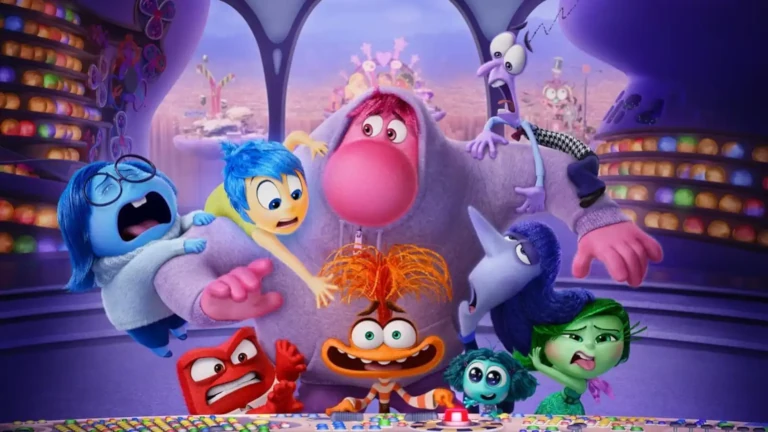

Inside Out 2 Characters
In Inside Out 2, the introspective ensemble is invigorated by the arrival of Anxiety, portrayed by Maya Hawke, whose meticulous and over-prepared nature introduces a new layer of complexity to Riley’s evolving psyche. Ennui, embodying teenage indifference with a perfected eye-roll, brings a languid charm that contrasts sharply with the existing vibrancy of Riley’s emotional spectrum. Meanwhile, Embarrassment adds a touch of red-faced realism to the mix, capturing the quintessential teenage dread of social faux pas, making every interaction with him both relatable and cringeworthy.
Joy
Joy, brilliantly voiced by Amy Poehler, epitomizes the effervescent spirit that pulsates through the heart of Riley Andersen in Inside Out and its eagerly anticipated sequel. As the radiant yellow personification of elation, Joy acts as Riley’s cheerleader and as the chief orchestrator of her mental state, constantly striving to paint every experience with strokes of happiness. Her perpetual optimism and dynamic energy make her the emotional core of the command center, always pushing for positivity regardless of the circumstances. Yet, Joy’s character is not without its complexities; her steadfast dedication to Riley’s happiness is both her greatest strength and her Achilles’ heel. As Riley matures into the throes of adolescence, Joy’s reluctance to embrace change challenges her usual adaptability, revealing a layer of inflexibility beneath her sunny exterior. This nuanced portrayal captures the delicate balance of holding onto joy while learning to navigate the broader spectrum of evolving emotions.
Disgust
Disgust, vividly brought to life by Mindy Kaling’s expressive voice, serves as Riley’s personal guardian against social and physical poisons in both Inside Out and its sequel. This green-hued emotion, with her impeccable sense of style and sharp tongue, acts as a critical filter through which Riley perceives the world, ensuring everything from her social interactions to her dietary choices meet the highest standards. Disgust’s role becomes particularly pivotal as Riley navigates the complex social landscape of high school, where fashion faux pas and awkward social interactions lurk at every corner. Characterized by her caustic wit and a discerning eye, Disgust is about rejection and negativity; she embodies a fierce protectiveness over Riley, ensuring that her charge maintains dignity and poise in the face of adolescence’s myriad challenges. Her high expectations and quick judgments, while occasionally bordering on the cynical, underscore a deep-seated loyalty and desire to see Riley thrive without compromising her values.
Sadness
Sadness, rendered with soulful depth in Inside Out and its sequel, emerges as a poignant figure embodying melancholy and empathy within Riley’s emotional ensemble. Voiced by Phyllis Smith, Sadness is characterized by her perpetual gloom and by a profound wisdom that often goes unnoticed by her vibrant counterparts. In the bustling landscape of Riley’s mind, where Joy aims to keep spirits high, Sadness introduces a necessary counterbalance, highlighting the importance of acknowledging and processing more somber feelings. Her ability to change the hue of Riley’s memories from joyful to sorrowful isn’t merely a narrative device; it serves as a critical mechanism through which Riley matures and learns to cope with life’s more complex, often painful realities. Sadness’s evolution in the story is a testament to her integral role in achieving emotional balance, demonstrating that true emotional health involves embracing a full spectrum of feelings, teaching both Riley and the audience the invaluable role that acknowledging sadness plays in healing and growth.
Anger
Anger, vibrantly voiced by Lewis Black in Inside Out and its sequel, embodies the fiery spirit of indignation with a combustible mix of passion and short fuses. Clad in his crisply pressed shirt and tie, Anger is quick to ignite over injustices, big or small, ensuring everything in Riley’s world is on the level. His core function within Riley’s emotional spectrum is to maintain a sense of fairness, often leading him to overreact when things deviate from his strict sense of right and wrong. While he appears aggressive and often erupts in literal flames of fury, Anger’s volcanic outbursts stem from a deep-seated commitment to protect and uphold Riley’s best interests. He’s about rage; Anger is also the custodian of justice in Riley’s mind, advocating vehemently for her needs and often acting as the driving force behind decisive actions that reshape her responses to the world around her. This complexity makes Anger a crucial character, balancing the scales between rational thought and emotional response in the chaotic world of adolescence.
